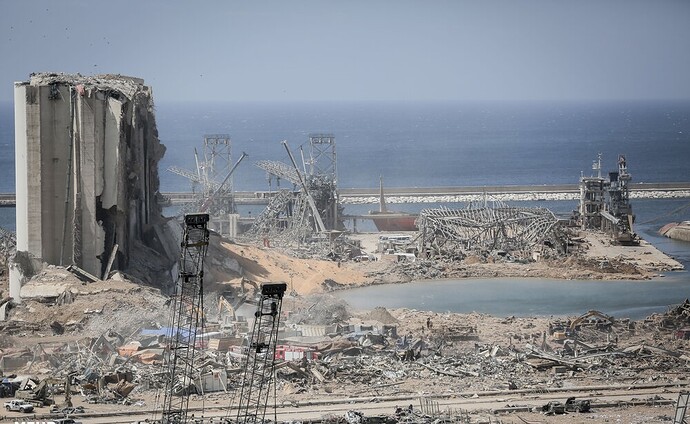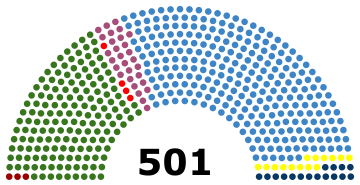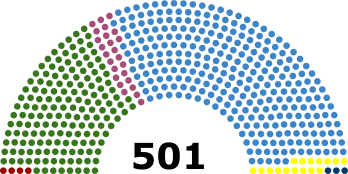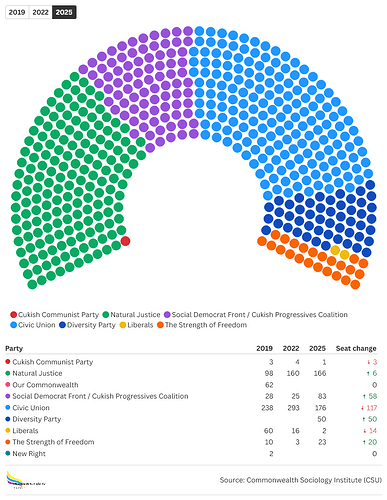27th July 2025
'Dear friends, allow me for a moment to interrupt this debate for a good reason: the Commonwealth Sociology Institute has just handed LLNTV the almost final results from the 2025 Cukish General Election. Our audience will be able to see them right now on their screens:
My colleagues were just debating on the exit poll, by which Natural Justice was on the way to win by a margin of two senators. It seems, however, that Karnéias will fulfill her desired fourth (or fifth) term as Mórna, despite her sounded defeat on the Válo. The Civic Union wins the election with 176 seats, only ten above the leaders of the opposition, Natural Justice. This means a loss of 117 seats from the 2022 record result of 293 senators, a drop expected to turn benefitial for Natural Justice, but from which they’ve only gained six seats. From these, half have been acquired from the Cukish Communist Party, which is on the brink of parliamentary disappearance with just one senator, Nepámir Aqádhwar herself, while the other three NJ seats are likely to be Civic Union losses. Most of Karnéias’s lost seats have gone in two different directions: on the one hand, to the Cukish Progressives Coalition, which triples its size in the Senate with 83 seats and looks likely to be key in government talks, while fifty have been earned by Antárez’s archipelagist Diversity Party, on the other hand. The Civic Union split of referendum dissidents were projected to be of significance in Shoneria, the only archipelago where the referendum on renaming the country was defeated, but it seems to have had a Commonwealth-wide impact, judging by the results. The Liberals, once one of the two pieces in old bipartianship and later Karnéias’s most trusted allies, have been reduced to parliamentary irrelevance, with two senators, while the referendum-opposed Strength of Freedom has risen from the ashes with 20 seats more than in 2022.
Colleagues, what do you have to say about this? Yes, Máne?’
‘Brilliant analysis as usual, Váli. If this election had to be titled somehow, I’d go with “Karnéias shook the Commonwealth, and the Commonwealth shook Karnéias”. She has achieved all of her political targets, including renaming the country itself, but her government is starting to feel the burden of her actions and of her long time as Mórna. Even when the referendum was successful and even when it was supported by all the main political options, 31% of the populace is not a small share to ignore. It’s also a loud opposition from even inside her own party, remember: to me, the rise of the Diversity Party is the most significant factor in this election. Karnéias’s catch-all party always had an expiration date, what we had to find out was the when and how. That’s it, there’s not much more to explain other than voter exhaustion and a very vocal and large minority.’
‘Your turn, Ridhwán.’
‘We’re forgetting how the most likely scenario for half a year until just ten minutes ago was a new Mórna. CPC key figures had already publicly supported a coalition with Amírbell, but that’s most probably out of the window now since they lack two senators to hold a majority. The CCP is not enough, the Liberals will not support any government with Natural Justice in it, and I doubt the Diversity Party will support anyone who backed the referendum, even more so with the possibility of another Karnéias government to get further gains from the Civic Union’s erosion. The question now is whether the CPC will be willing to form a coalition with Karnéias, thus returning to the government for the first time in almost a decade, or if they want to keep an image of an opposition compromised with stability, by which they could vote for Karnéias’s appointment but they would stay out of the government.’
‘Go ahead, Qúns.’
‘I’m afraid I’m raising yet another dense topic with my interpretation, but let’s see. The common topic here seems to be a change of political course. The six years of political stability and Civic Union domination are over, Karnéias has suffered her own Sverdrup effect (while apparently surviving at it), and the Civic Union does not agglutinate most of the centrist voters anymore, it splits for the first time, and soundly so. Their narrative control of the last decade of Cukish politics continues to be rigid, though: the Natural Justice concerns over the full ecological transition and democratising the UCA won’t be on the public spot today. Instead, we’ll be talking about the biggest tabboo of this country we live in: what even is our country? The Civic Union raised that question by calling the referendum, but now their own narrative has turned against them, at least partially and for the time being. As much as Karnéias built a party to agglutinate the whole citizenry, and as much as the country’s name is now unified, the cultural, geographical and political diversity is undeniable, and hiding our multiple shades has been the Civic Union’s demise in this election. We have an archipelagist party back in the Senate, and, after the widest majority in the Commonwealth’s history and despite Karnéias’s probable return to office, we now have one of the most uncertain political scenarios in the Commonwealth’s history.’
‘I encourage you three and the rest of tonight’s panellists to take many notes and to reply to each other after the break we now head into. It’s Areuína Karnéias’s victory speech, we’ll be back after it.’







